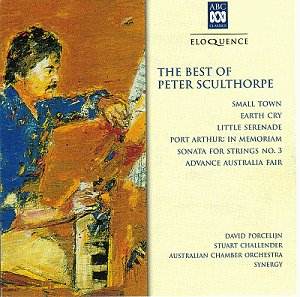As Peter Sculthorpe approaches his 73rd
birthday, this disc is a welcome and timely reminder of the range and
importance of the man who has devoted his life and music to the representation
of Australia, and to the unique experience of ‘being’ Australian. It’s
a pity that it doesn’t include anything from his large output for string
quartet (15 to date) as it was his 8th Quartet that opened
Kronos’s sensational debut album and effectively put Sculthorpe on the
musical map. Still, we get a good cross-section of early, middle and
recent work in what might well be called ‘definitive’ performances from
indigenous artists Sculthorpe has worked with over the years.
The longest extract is rightly devoted to one of his
famous ‘Sun Music’ series, begun in the mid-sixties and effectively
establishing his Australian ‘credo’. The third dates from 1967 and as
the composer later recalled," I wrote most of Sun Music III at
a time when it was snowing up in New York State, and often I’d look
out of the window and dream of a place like Bali, an endless warm paradise’.
But as the critic Roger Covell has rightly warned, "this is not in any
sense bronzed, swaggering holiday music … it has more to say about the
mystery, fear and lonely glare of the sun than about the pleasures of
warmth. This is sun music written by a composer living in a country
where the sun can be as much an enemy as a friend." Indeed, the
shimmering strings and Balinese-sounding percussion ensemble generate
a strange and heady mixture; the tropical warmth that Sculthorpe was
longing for is contrasted with Penderecki-style tone clusters that accurately
reflect the beauty and danger of his subject.
The other substantial piece on the disc is Earth Cry,
an orchestral work commissioned by the Australian Broadcasting Corporation
in 1986. There is a brooding menace from the slow introduction onwards,
and much of the music is a genuine ‘cry’ of outrage for the land and
its native inhabitants. As the composer so eloquently puts it, "Whenever
I have returned from abroad in recent years, this country has seemed
to me to be one of the last places on earth where one could write quick
and joyous music. I decided therefore to write such a piece. [But] it
soon became clear this would be dishonest of me … the lack of common
cause and the self-interest of many have drained us (Australians) of
much of our energy. A bogus national identity and its commercialisation
have obscured the true breadth of our culture. Most of the jubilation,
I came to feel, awaits us in the future. Perhaps we now need to attune
ourselves to this continent, to listen to the cry of the earth, as the
Aborigines have done for thousands of years."
The closest we get on the disc to his chamber output
is the Sonata for Strings No. 3, rearranged in 1993 from his String
Quartet No. 11 (Jabiru Dreaming), another Kronos-inspired work from
1990. In its ‘beefed-up’ form it emerges as a curiously English-sounding
piece (its bird-like sound effects apart), and the rhythmic energy and
contrapuntal interplay recall Tippett at his most ebullient. Another
‘Englishness’ is evoked in the short Christmas carol Awake, Glad Heart,
originally composed in 1988 and also existing in a version for two trumpets
and strings. Maybe Sculthorpe’s early studies at Oxford with, amongst
others, Edmund Rubbra, were in the back of his mind here?
Of the rest of the works represented here, the unforced
lyricism of the Little Serenade (1968) and Calmo movement from the Piano
Concerto (1983) are hard to dislike; the sheer simplicity of utterance
can sound astonishing for a contemporary composer. And yet this veritable
celebration of traditional tonality is in many ways something to be
grateful for. In an ever cynical modern world where ethics and honesty
often count for little, the moving integrity of Peter Sculthorpe is
a welcome tonic. This cheap, well-annotated and presented compilation
can only help his cause.
Peter Haywood


